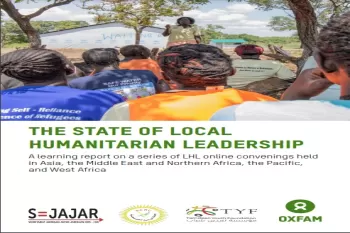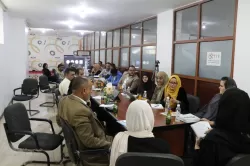Aden: Government Support for Humanitarian Action Localization and Economic Recovery Initiatives
The Ministry of Planning and International Cooperation announced its support for the Humanitarian Action Localization and Economic Recovery Initiatives and confirmed its support for enabling local organizations to lead the humanitarian response and optimize their efficiency and sustainability mechanisms.
This was at a discussion session in Aden held by Mr. Hussein Al Suhaily, Chairman of Tamdeen Youth Foundation, Coordinator of the Humanitarian Action Localization Initiative in Yemen, Coordinator of the National Economic Recovery Program, with the Under-Secretary of the Ministry of Planning, Project Sector, Eng. Wazira Al Sharmani. The session focused on the localization and economic recovery initiatives, and mechanisms of coordination and cooperation to optimize humanitarian response mechanisms and move the work of organizations from emergency relief to recovery and sustainable development.
Al Suhaily stressed that the humanitarian crisis in Yemen will continue, as long as the methodology of emergency and relief interventions continued to be addressed with limited sustainable impact, participatory planning was ignored and resources were not directed towards recovery, economic empowerment, and development.
He pointed out that the efforts of local organizations to localize humanitarian action in Yemen and optimize humanitarian response mechanisms are an urgent need to address the humanitarian crisis, through a medium- and long-term economic and development perspective, taking into account the empowerment of local organizations, the priorities of beneficiary communities and groups and government actors, the participation in identifying needs and projects with sustainable and income-generating socio-economic impact, and the creation of job opportunities; while linking humanitarian interventions to recovery and development.
Eng. Wazira Al Sharmani expressed the Ministry's support for the localization and recovery initiatives to effectively direct assistance to development programs, provide all necessary facilities to enable local organizations, and overcome the difficulties faced by government and humanitarian partners to ensure the success of their interventions and projects.
She also stressed the importance of coordinating with the Ministry of Planning, integrating with it in optimizing humanitarian response mechanisms, linking them to recovery and economic recovery, and implementing projects according to needs lists based on the Government's surveys for donors, to avoid duplication of projects and prevent repeated targeting of specific areas and sectors, while many areas and sectors were priorities.
The two parties have agreed to establish a joint team to held consultative meetings with the Government, UN, International and local organizations, the private sector, and donors, to agree on a strategy for optimizing the humanitarian response and economic recovery mechanisms, to assess the impact of assistance and the work of humanitarian organizations over the past years, to analyze the shortcomings of all parties of humanitarian and development action, to activate the role of the Central Bureau of Statistics and Scientific Research Centers at universities in preparing recovery and development plans to share priorities and rehabilitate the infrastructure.
The meeting was attended by Zuhair Hamid, the Ministry’s Director-General of NGOs, Nizar Ahmed, the Ministry’s Director-General of Energy and Industry Projects, Dr. Ali Al Buraihi, a member of TYF’s Board of Trustees, Dr. Nadin Abdulqadir, TYF’s Government and Relations Liaison, and Ms. Bushra Abdullah, TYF’s MEAL Officer.




